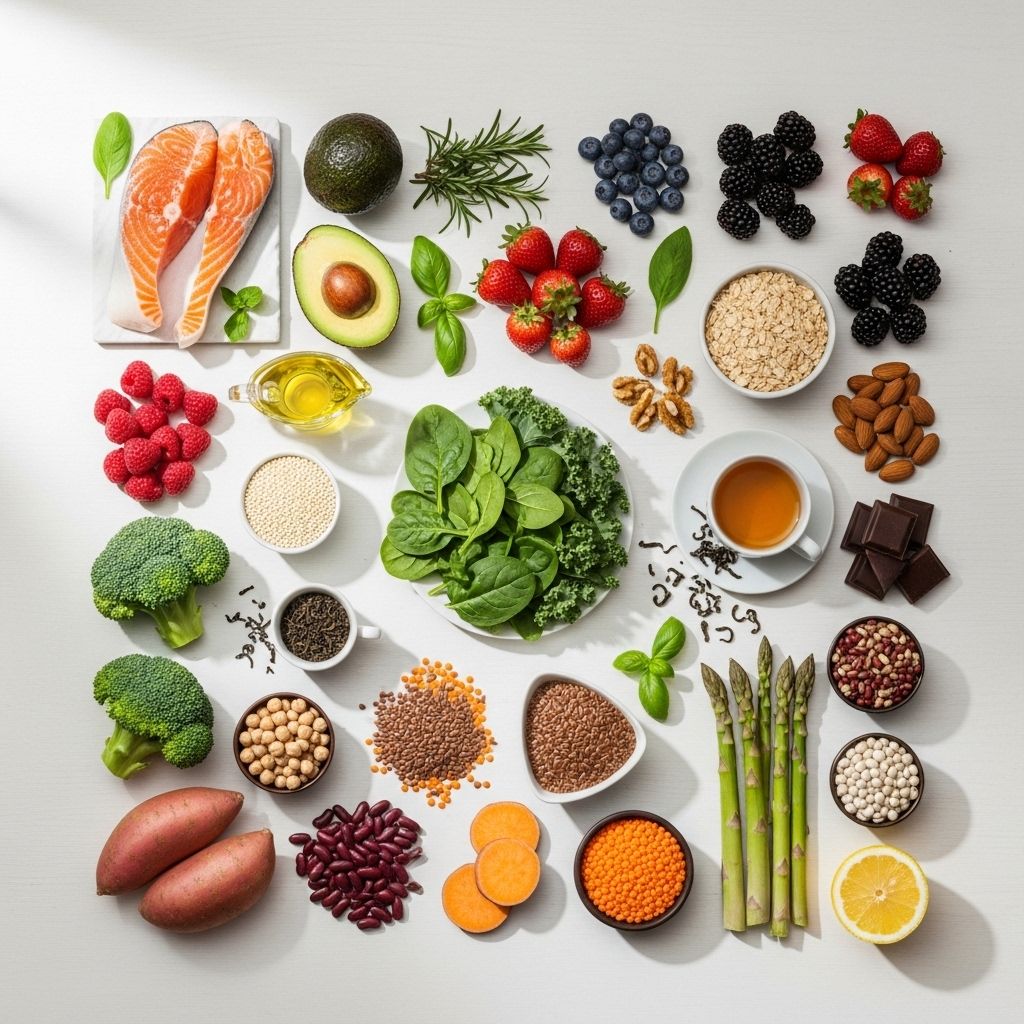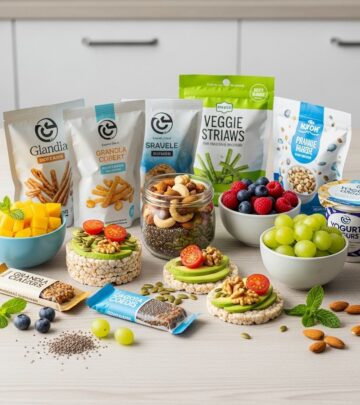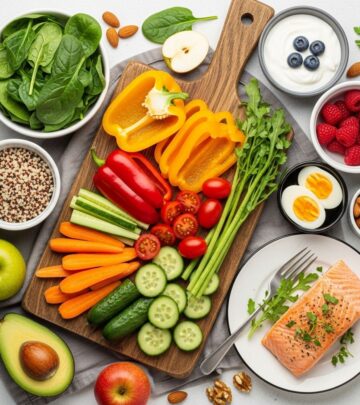25 Best Foods to Boost Heart Health: Nutrient-Rich Choices for a Stronger Heart
Simple pantry staples deliver powerful heart support and everyday vitality.

25 Best Foods to Boost Heart Health
Your heart is one of the most vital organs, responsible for pumping oxygen and nutrients throughout your body. Maintaining its wellness is essential for a long and fulfilling life. The right foods, rich in fiber, beneficial fats, antioxidants, and essential nutrients, can help support your cardiovascular system and reduce the risk of heart disease. This comprehensive guide lists the top 25 heart-protective foods and snacks, supported by expert recommendations and the latest research.
Why Focus on Heart-Healthy Foods?
Cardiovascular disease remains a leading health concern globally, but lifestyle choices—especially diet—can dramatically impact risk factors for high blood pressure, high cholesterol, and inflammation. A pattern that emphasizes unprocessed whole foods, plant-based ingredients, nuts, seeds, healthy oils, and fish is consistently linked with stronger heart health, less inflammation and better overall outcomes. Experts recommend focusing on foods you can add to your diet, rather than what you must restrict.
The 25 Best Foods for Heart Health
- Barley
Barley is a versatile whole grain available in pearled, flakes, flour, or grits forms. Barley delivers more fiber than most grains, especially beta-glucans, which help regulate blood sugar and cholesterol. It also contains heart-protective flavonoids and phytochemicals. Try barley in soups, stews, salads, or pilafs.
- Oranges
This citrus fruit is rich in pectin, a soluble fiber that may modestly lower cholesterol, and it packs more potassium than bananas, which supports healthy blood pressure. Enjoy oranges whole, or as fresh juice, but limit added sugar.
- Low-Fat Yogurt
Yogurt is an excellent source of calcium and potassium, two minerals essential for blood pressure regulation. Always choose plain, unsweetened yogurt for minimal sugar content; sweeten naturally with fruit or a drizzle of honey, and add a sprinkle of cinnamon for flavor and added antioxidants.
- Cherries
Cherries are high in anthocyanins, antioxidants linked with lowered stroke risk. These compounds reduce inflammation and protect blood vessel health. Fresh, frozen, or dried cherries can be added to snacks, breakfasts, and salads.
- Sardines
Sardines are among the most concentrated sources of omega-3 fatty acids, which help lower triglycerides and blood pressure. Sardines are low-mercury, high-calcium, and a great option canned or fresh in salads, pasta, or toast.
- Nuts
Nuts provide polyphenols and unsaturated fats that improve cholesterol and lower heart disease risk. Keep raw almonds, cashews, pecans, pistachios or hazelnuts on hand for smart snacking. A small handful daily can be beneficial.
- Walnuts
Walnuts deserve special mention for their high omega-3 content, fiber, and anti-inflammatory benefits. Add walnuts to oatmeal, yogurt parfaits, or enjoy them as a crunchy snack.
- Leafy Greens
Kale, spinach, Swiss chard, romaine, and other lettuces are rich in vitamins (K, A, C), potassium, and antioxidants. Their nitrates help relax blood vessels and balance blood pressure. A large study found women who consumed the most leafy greens had markedly lower risk of coronary heart disease.
- Swiss Chard
Dark leafy Swiss chard offers potassium, magnesium, and fiber, as well as vitamins that regulate blood sugar and reduce inflammation. Sauté, add to soups, or use as a base for hearty salads.
- Oats
Classic oatmeal contains soluble fiber that helps reduce LDL (‘bad’) cholesterol. Its unique avenanthramides deliver anti-inflammatory and heart-protective effects. Mix oats into breakfasts, baking, or overnight oats.
- Olive Oil
Extra-virgin olive oil is a staple of Mediterranean cuisine and associated with a dramatically lower risk of dying from heart disease. Use olive oil for salad dressings, sautéing, or drizzling over roasted vegetables.
- Berries
Blueberries, strawberries, raspberries, and blackberries are antioxidant powerhouses. They lower LDL cholesterol, systolic blood pressure, and markers of inflammation. Add berries to cereal, smoothies, yogurt, or desserts.
- Beans
Beans are protein-rich, high in fiber, cost-effective, and sustainable. They promote lower blood pressure, less inflammation, and reduced LDL cholesterol and triglycerides. Enjoy beans in soups, salads, chilis, or dips.
- Avocados
Avocados are filled with heart-friendly monounsaturated fats and potassium. These nutrients help lower cholesterol and blood pressure. Enjoy them in salads, toast, salsa, or smoothies.
- Whole Grains
Brown rice, quinoa, farro, bulgur, and whole-wheat products are staples of heart-friendly diets. They provide complex carbohydrates, fiber, vitamins, and minerals critical for heart function.
- Fatty Fish
Salmon, mackerel, trout, and anchovies supply omega-3s, protein, and vitamin D. These support healthy heart rhythms and reduce inflammation. Aim for two servings per week.
- Tomatoes
Tomatoes are a great source of lycopene, a powerful antioxidant shown to reduce cholesterol and blood pressure. Enjoy tomatoes fresh, roasted, in sauces or salads.
- Seeds
Chia, flax, pumpkin, and sunflower seeds are packed with fiber, plant-based omega-3 fatty acids, and minerals. Sprinkle seeds on yogurt, cereal, or salads for extra crunch and nutrition.
- Cruciferous Vegetables
Broccoli, cauliflower, Brussels sprouts, and cabbage contain unique compounds and fiber with proven benefits for cholesterol and inflammation, supporting a healthy heart.
- Herbs and Spices
Fresh herbs like parsley, basil, and mint add flavor and supply beneficial vitamins and minerals, while spices such as garlic, ginger, turmeric, cinnamon, and cayenne offer anti-inflammatory properties that protect heart vessels.
- Legumes
Lentils, chickpeas, and split peas deliver plant-based protein, minerals, and fiber, which improve cholesterol and maintain healthy blood sugar.
- Bell Peppers
Bells peppers offer vitamin C, potassium, beta-carotene, and fiber. They are delicious raw, roasted, or stir-fried, and help create balanced, heart-healthy meals.
- Sweet Potatoes
Sweet potatoes provide potassium, fiber, beta-carotene, and antioxidants, boosting cardiovascular function when served baked, mashed, or in stews.
- Citrus Fruits
Beyond oranges, grapefruits, lemons, and limes contain flavonoids and vitamin C that lower blood pressure and cholesterol, enhancing heart health.
- Dark Chocolate (in moderation)
Cocoa-rich dark chocolate delivers flavanols that may improve blood flow and reduce inflammation. Choose varieties with at least 70% cocoa and consume in modest amounts.
Expert Tips for a Heart-Healthy Diet
- Choose Healthy Fats: Opt for unsaturated fats from olive oil, avocado, nuts, seeds, and fatty fish—which improve cholesterol and lower inflammation.
- Increase Fiber Intake: Gradually add more fiber-rich foods like whole grains, beans, berries, and vegetables to your meals for improved cholesterol and better digestion.
- Reduce Sodium: Limit processed and restaurant foods, use herbs and spices for flavor instead of salt, and always check for low-sodium options when buying canned goods.
- Cook More at Home: Preparing homemade meals allows greater control over sodium, sugar, and fat intake.
- Experiment With Flavor: Try various international cuisines, using garlic, ginger, curry, or paprika to make meals exciting and nutritious.
Sample Table: Heart-Healthy Components of Key Foods
| Food | Key Nutrients | Main Benefit for Heart |
|---|---|---|
| Barley | Fiber, Flavonoids | Regulates cholesterol & blood sugar |
| Oranges | Pectin, Potassium | Lowers cholesterol & blood pressure |
| Walnuts | Omega-3, Polyphenols | Reduces inflammation, cholesterol |
| Berries | Antioxidants, Fiber | Improves cholesterol & blood pressure |
| Leafy Greens | Vitamin K, Nitrate, Magnesium | Balances blood pressure & vascular health |
| Sardines | Omega-3, Calcium | Lowers triglycerides, protects blood vessels |
Frequently Asked Questions (FAQs)
Q: How can I start eating more heart-healthy foods?
Begin by gradually adding more fruits, vegetables, whole grains, nuts, and beans to meals. Try swapping processed snacks with raw nuts or seeds, and use olive oil for cooking instead of butter.
Q: Are all fats bad for the heart?
No. Unsaturated fats found in olive oil, avocados, nuts, and fatty fish are beneficial, while saturated and trans fats (in processed and fried foods) can worsen cholesterol and raise cardiovascular risk.
Q: Can I eat these foods if I have high blood pressure?
Absolutely. Most foods on this list are high in potassium and fiber, both of which help regulate blood pressure. Emphasize fresh produce, whole grains, legumes, and avoid highly salted or processed foods.
Q: Is dark chocolate actually heart-healthy?
Yes, in moderation. Select chocolate with at least 70% cacao and consume sparingly to enjoy flavanols, which improve blood flow and vessel function.
Q: How much fish should I eat weekly for heart benefits?
Experts recommend two servings of fatty fish per week. If you don’t eat fish, consider plant-based sources of omega-3s, like walnuts or flaxseed.
Key Takeaways for Heart Health
- Diversity matters: The more variety in your diet, the more likely you are to get the full spectrum of heart-protective nutrients.
- Unprocessed is best: Focus on whole foods, minimize processed and packaged foods.
- Snack smart: Swap chips or candy for nuts, seeds, berries, or fresh veggies.
- Customize for taste: Use spices, herbs, and citrus to boost flavor without extra salt.
- Keep hydrated: Drink plenty of water and limit sugary beverages.
Further Reading
- 45 Ways to Add More Kale to Your Life
- Best Whole Grain Cereals for Heart Health
- How to Freeze, Dry and Can Cherries Year-Round
References
- https://abcnews.go.com/GMA/Food/heart-healthy-recipes-expert-tips-boost-diet/story?id=97198385
- https://www.goodhousekeeping.com/health/diet-nutrition/g35396515/best-foods-for-heart-health/
- https://www.goodmorningamerica.com/food/story/heart-healthy-recipes-expert-tips-boost-diet-97198385
- https://www.goodhousekeeping.com/heart-health-advice/
- https://www.cedars-sinai.org/newsroom/good-housekeeping-4-surprising-signs-of-vitamin-d-deficiency-you-should-know/
- https://www.nhlbi.nih.gov/health/heart-healthy-living/healthy-foods
- https://search.library.ohio.gov/discovery/fulldisplay/alma991015417797608520/01OHIOLINK_SLO:SLO
Read full bio of medha deb












